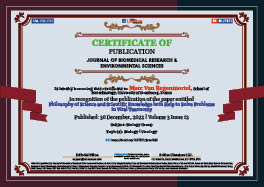Marc Van Regenmortel*
Volume3-Issue12
Dates: Received: 2022-12-20 | Accepted: 2022-12-27 | Published: 2022-12-30
Pages: 1545-1547
Abstract
Biological classifications are made up of abstract classes created by biologists such as species, genera, families, and orders. Members of the lower species class are also members of the classes above it and this class inclusion is responsible for the fact that genera and families, for example, have more members than species and therefore require fewer properties to meet the qualification for membership. Class membership is the logical relation that allows a link to be established between physical organisms and conceptual constructs such as classes and taxa. A philosophical approach to science is useful for analyzing the ontology and epistemology of viruses and of living organisms, and it has led to a processual interpretation of organisms and viruses in terms of continuous self-generating processes of development and evolution. The need to distinguish between the antigenicity and immunogenicity of viral proteins is emphasized because confusion between these two concepts makes it very difficult for vaccinologists to develop vaccines.
FullText HTML
FullText PDF
DOI: 10.37871/jbres1633
Certificate of Publication

Copyright
© 2022 Van Regenmortel M. Distributed under Creative Commons CC-BY 4.0
How to cite this article
Van Regenmortel M. Philosophy of Science and Scientific Knowledge both Help to Solve Problems in Viral Taxonomy. 2022 Dec 30; 3(12): 1545-1547. doi: 10.37871/jbres1633, Article ID: JBRES1633, Available at: https://www.jelsciences. com/articles/jbres1633.pdf
Subject area(s)
References
- Ereshefsky M. Darwin’s solution to the species problem. Synthese. 2009;175:405-427.
- LWOFF A. The concept of virus. J Gen Microbiol. 1957 Oct;17(2):239-53. doi: 10.1099/00221287-17-2-239. PMID: 13481308.
- Buck RC, Hull DL. The logical structure of the Linnaean hierarchy. Syst Zool. 1966;15:97-111.
- Pringle CR. Virus species, higher taxa and other matters. The 20th meeting of the executive committee of the ICTV. Arch Virol. 1991;119:303-304.
- Van Regenmortel MH, Maniloff J, Calisher C. The concept of virus species. Arch Virol. 1991;120(3-4):313-4. doi: 10.1007/BF01310487. PMID: 1958131.
- Van Regenmortel MHV. Logical puzzles and scientific controversies. The nature of species, viruses, and living organisms. The Systematic and Applied Microbiology. 2010;33:1-6. doi: 10.1016/j.syapm.2009.11.001.
- Quine W. Quiddities: An Intermittently Philosophical Dictionary. London: Penguin Books; 1987.
- Forterre P. The virocell concept and environmental microbiology. ISME J. 2013;7:233-236.
- Moreira D, López-GarcÃa P. Ten reasons to exclude viruses from the tree of life. Nat Rev Microbiol. 2009 Apr;7(4):306-11. doi: 10.1038/nrmicro2108. Epub 2009 Mar 9. PMID: 19270719.
- Quine WV, Ullian JS. The Web of Belief. New York: MCGRAW-Hill; 1978.
- Baldwin JT, Lessmann, O. What is Russell’s Paradox? Scientific American. 1998.
- Fenner F. Classification and nomenclature of viruses. Second report of the International Committee on Taxonomy of Viruses. Intervirology. 1976;7(1-2):1-115. doi: 10.1159/000149938. PMID: 826499.
- Rescher N. Scientific Explanation. New York: The Free Press; 1970.
- Nicholson DJ, Dupre, J. Everything Flows. Towards a processual philosophy of biology. Oxford University Press; 2018.
- Van Regenmortel MHV. Specificity, polyspecificity, and heterospecificity of antibody-antigen recognition. Journal of Molecular Recognition. 2014;27:627-639. doi: 10.1002/jmr.2394.
- Mascola JR, Haynes BF. HIV-1 neutralizing antibodies: understanding nature's pathways. Immunol Rev. 2013 Jul;254(1):225-44. doi: 10.1111/imr.12075. PMID: 23772623; PMCID: PMC3738265.